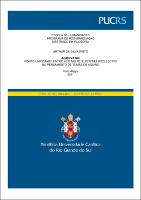| Share record |


|
Please use this identifier to cite or link to this item:
https://tede2.pucrs.br/tede2/handle/tede/9588Full metadata record
| DC Field | Value | Language |
|---|---|---|
| dc.creator | Pinto, Arthur da Silva | - |
| dc.creator.Lattes | http://lattes.cnpq.br/6829158661348654 | por |
| dc.contributor.advisor1 | Pich, Roberto Hofmeister | - |
| dc.contributor.advisor1Lattes | http://lattes.cnpq.br/1645884955155770 | por |
| dc.date.accessioned | 2021-05-04T19:15:24Z | - |
| dc.date.issued | 2021-03-24 | - |
| dc.identifier.uri | http://tede2.pucrs.br/tede2/handle/tede/9588 | - |
| dc.description.resumo | A presente dissertação busca trazer a importância da discussão acerca dos transcendentais, presente na reflexão filosófica da Idade Média, mais especificamente, durante o século XIII. Mostrar-se-á que esta, presente de forma fecundativa na Summa de bono de Felipe o Chanceler e de modo gestativo nas obras de Alexandre de Hales e de Alberto Magno, veio a eclodir no pensamento de Tomás de Aquino – de modo especial em Quaestiones disputatae de veritate, Summa Theologiae e In quattuor libros Sententiarum – que foi capaz de expandir os conceitos elaborados pelos seus antecessores em concepções mais apuradas, dentre as quais, este trabalho focará na compreensão acerca do verum, o qual demonstra a adaequatio como noção mais precisa para este intento, tendo como escopo o ponto unificante de veritas rei e veritas intellectus. Esta compreensão, enfim, abrirá espaço para a possibilidade de colocar em pauta algumas considerações de como a fórmula de adaequatio pode repercutir na epistemologia tomasiana, enquanto processo – segundo o qual a quididade cognoscível de res se torna inteligível para o intellectus humano –, e se esta auxilia a compreender a fórmula da adaequatio tal como ela pertence ao transcendental verum como informação adicional acerca do transcendental ens. | por |
| dc.description.abstract | This Master Thesis seeks to bring the importance of the discussion about transcendentals, present in the philosophical reflection of the Middle Ages, more specifically, during the 13th century. It will be shown that the latter, present in a fertile form in Philip the Chancellor’s Summa de bono and in a gestational way in the works of Alexander of Hales and Albert the Great, came to rise in Thomas Aquinas’ thought – especially in Quaestiones disputatae de veritate, Summa Theologiae, and In quattuor libros Sententiarum – who was able to expand the concepts elaborated by his predecessors in more refined conceptions, among which, this work will focus on the understanding about the verum that demonstrates the adaequatio whilst the most accurate notion for this purpose, having as its scope the unifying point of veritas rei and veritas intellectus. This understanding, finally, will open space for the possibility of bringing some considerations of the way the adaequatio formula can have repercussions on the Thomasian epistemology, as a process – according to which the knowable quidity of res becomes intelligible to the human intellectus –, and whether the latter helps or does not help to understand the adaequatio formula as it belongs to the transcendental verum as additional information about the transcendental ens. | eng |
| dc.description.provenance | Submitted by PPG Filosofia ([email protected]) on 2021-04-22T16:41:13Z No. of bitstreams: 1 ARTHUR_DA_SILVA_PINTO_Dis.pdf: 1320703 bytes, checksum: 9e1ba9f7ec1800fcda0ec915fad3d2fb (MD5) | eng |
| dc.description.provenance | Approved for entry into archive by Sheila Dias ([email protected]) on 2021-05-04T19:08:52Z (GMT) No. of bitstreams: 1 ARTHUR_DA_SILVA_PINTO_Dis.pdf: 1320703 bytes, checksum: 9e1ba9f7ec1800fcda0ec915fad3d2fb (MD5) | eng |
| dc.description.provenance | Made available in DSpace on 2021-05-04T19:15:24Z (GMT). No. of bitstreams: 1 ARTHUR_DA_SILVA_PINTO_Dis.pdf: 1320703 bytes, checksum: 9e1ba9f7ec1800fcda0ec915fad3d2fb (MD5) Previous issue date: 2021-03-24 | eng |
| dc.description.sponsorship | Coordenação de Aperfeiçoamento de Pessoal de Nível Superior - CAPES | por |
| dc.format | application/pdf | * |
| dc.thumbnail.url | http://tede2.pucrs.br:80/tede2/retrieve/180586/ARTHUR_DA_SILVA_PINTO_Dis.pdf.jpg | * |
| dc.language | por | por |
| dc.publisher | Pontifícia Universidade Católica do Rio Grande do Sul | por |
| dc.publisher.department | Escola de Humanidades | por |
| dc.publisher.country | Brasil | por |
| dc.publisher.initials | PUCRS | por |
| dc.publisher.program | Programa de Pós-Graduação em Filosofia | por |
| dc.rights | Acesso Aberto | por |
| dc.subject | Transcendentais | por |
| dc.subject | Adaequatio | por |
| dc.subject | Verum | por |
| dc.subject | Verdade da Coisa | por |
| dc.subject | Verdade do Intelecto | por |
| dc.subject.cnpq | CIENCIAS HUMANAS::FILOSOFIA | por |
| dc.title | Adæqvatio : ponto unificante entre veritas rei e veritas intellectvs no pensamento de Tomás de Aquino | por |
| dc.type | Dissertação | por |
| dc.restricao.situacao | Trabalho não apresenta restrição para publicação | por |
| Appears in Collections: | Programa de Pós-Graduação em Filosofia | |
Files in This Item:
| File | Description | Size | Format | |
|---|---|---|---|---|
| ARTHUR_DA_SILVA_PINTO_Dis.pdf | ARTHUR_DA_SILVA_PINTO_DIS | 1.29 MB | Adobe PDF |  Download/Open Preview |
Items in DSpace are protected by copyright, with all rights reserved, unless otherwise indicated.




